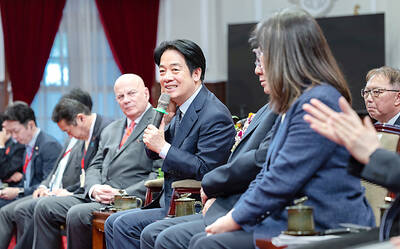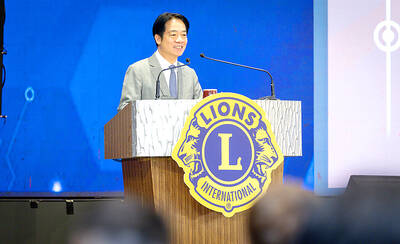China’s derecognition of the Sino-Japanese Treaty has left no basis for the Republic of China (ROC) to team up with Beijing in defense of sovereignty over the Diaoyutai Islands (釣魚台), the Ministry of Foreign Affairs said yesterday.
Given that the treaty is the main basis for the ROC’s declaration of sovereignty over the Diaoyutais and that China does not recognize it as valid, “there is no basis for cross-strait cooperation” on the matter, ministry spokesperson Steve Hsia (夏季昌) said during a regular news briefing.
Hsia was asked by reporters to elaborate on comments President Ma Ying-jeou (馬英九) reportedly made at a closed-door meeting with China-based Taiwanese businesspeople on Monday giving three reasons why it was unlikely that Taiwan and China would join hands to guard the islands.
The Sino-Japanese Treaty, also known as Treaty of Taipei, was signed on April 25, 1952, by the ROC and Japan and took effect on Aug. 5 that year.
Ma and the Chinese Nationalist Party (KMT) have said that under the treaty Japan agreed to return Taiwan, the Penghu Islands, as well as the Spratly Islands (Nansha Islands, 南沙群島) and the Paracel Islands (Xisha Islands, 西沙群島) to the ROC.
The treaty also nullified all agreements with Japan concluded before the ROC declared war on Japan, including the 1895 Treaty of Shimonoseki, under which Ma claims the Diaoyutais were ceded to Japan.
The Diaoyutais are administered by Japan, which calls them the Senkaku Islands. China also claims sovereignty over what it calls the Diaoyu Archipelago (釣魚群島).
Ma reportedly told the businesspeople that the Diaoyutais came under the administration of China in the 15th century, which held them until they were taken by Japan after 1895, the Central News Agency (CNA) reported.
CNA cited Ma as saying the government has not received a response from China to the peace initiative he proposed in August last year that called on the concerned countries to set aside the territorial row and jointly explore resources in the region.
Ma said China has hoped that his administration would refrain from touching upon the issue of sovereignty over the Diaoyutais with Japan after Taipei and Tokyo resume talks on fishing rights in the area, but he did not think it would be possible to avoid the issue, the CNA report said.
“How can we have the right to fish if we do not have sovereignty over the region?” CNA quoted Ma as saying.

Two US House of Representatives committees yesterday condemned China’s attempt to orchestrate a crash involving Vice President Hsiao Bi-khim’s (蕭美琴) car when she visited the Czech Republic last year as vice president-elect. Czech local media in March last year reported that a Chinese diplomat had run a red light while following Hsiao’s car from the airport, and Czech intelligence last week told local media that Chinese diplomats and agents had also planned to stage a demonstrative car collision. Hsiao on Saturday shared a Reuters news report on the incident through her account on social media platform X and wrote: “I

‘BUILDING PARTNERSHIPS’: The US military’s aim is to continue to make any potential Chinese invasion more difficult than it already is, US General Ronald Clark said The likelihood of China invading Taiwan without contest is “very, very small” because the Taiwan Strait is under constant surveillance by multiple countries, a US general has said. General Ronald Clark, commanding officer of US Army Pacific (USARPAC), the US Army’s largest service component command, made the remarks during a dialogue hosted on Friday by Washington-based think tank the Center for Strategic and International Studies. Asked by the event host what the Chinese military has learned from its US counterpart over the years, Clark said that the first lesson is that the skill and will of US service members are “unmatched.” The second

STANDING TOGETHER: Amid China’s increasingly aggressive activities, nations must join forces in detecting and dealing with incursions, a Taiwanese official said Two senior Philippine officials and one former official yesterday attended the Taiwan International Ocean Forum in Taipei, the first high-level visit since the Philippines in April lifted a ban on such travel to Taiwan. The Ocean Affairs Council hosted the two-day event at the National Taiwan University Hospital International Convention Center. Philippine Navy spokesman Rear Admiral Roy Vincent Trinidad, Coast Guard spokesman Grand Commodore Jay Tarriela and former Philippine Presidential Communications Office assistant secretary Michel del Rosario participated in the forum. More than 100 officials, experts and entrepreneurs from 15 nations participated in the forum, which included discussions on countering China’s hybrid warfare

MORE DEMOCRACY: The only solution to Taiwan’s current democratic issues involves more democracy, including Constitutional Court rulings and citizens exercising their civil rights , Lai said The People’s Republic of China (PRC) is not the “motherland” of the Republic of China (ROC) and has never owned Taiwan, President William Lai (賴清德) said yesterday. The speech was the third in a series of 10 that Lai is scheduled to deliver across Taiwan. Taiwan is facing external threats from China, Lai said at a Lions Clubs International banquet in Hsinchu. For example, on June 21 the army detected 12 Chinese aircraft, eight of which entered Taiwanese waters, as well as six Chinese warships that remained in the waters around Taiwan, he said. Beyond military and political intimidation, Taiwan